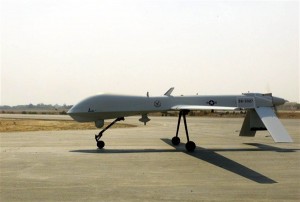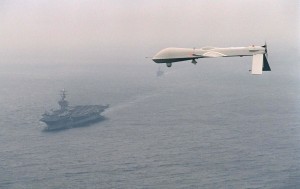
The Strategic Effects of a Lethal Drones Policy
Understanding drones in a broader context.
Drones have become a major policy tool in U.S. counterterrorism policy. In at least five countries – Yemen, Somalia, Iraq, Pakistan, and Afghanistan – U.S. drones patrol the skies and occasionally are used to launch lethal strikes against suspected terrorists. Drones have also become the primary topic of debate within the policy community.
The public discussion about the lethal drones policy, however, has mostly focused on narrow questions of effectiveness: does it kill terrorists, or too many civilians? The debate lacks strategic context and framing.
ASP is creating a strategic dialogue about the global effects of drones. Drones might be effective at some tasks; but do we really understand how effective they are in the long run, on a global scale? We seek to understand what the long term effects of this new tool are.
Background
The U.S. first targeted a suspected terrorist with a lethal drone strike in 2002. On November 5, 2002, a US Predator Drone fired a hellfire missile at a car traveling through the Mar’ib province of Yemen, destroying it and killing the six people inside. One of the dead was a US citizen. One of the dead was the country’s most senior level al Qaeda operative, wanted for the October 12, 2000 bombing of the USS Cole that killed 17 sailors.
Two years later, a U.S. drone targeted Nek Muhammad Wazir, the leader of an insurgency in Northwest Pakistan. Officials had accused Wazir of harboring al Qaeda and Taliban figures. He had just signed a ceasefire with the Pakistani government, but the agreement was fraught with disagreements between the insurgents and the government over terms; while they were arguing about those terms a U.S. drone killed Wazir.
Over the next seven years, the frequency of drone strikes in Pakistan increased steadily. Under President Bush there was a drone strike about once every forty days; under President Obama that increased to one drone strike every four days. Supporters of the program laud its effectiveness at killing al Qaeda leaders.
During this same increase in drone strikes, however, U.S. relations with Pakistan have plummeted. In January of 2011, Raymond Davis, a man later identified as a CIA contractor developing targets for the drones program, killed two Pakistani men during a botched mugging in Lahore. The popular uproar in Pakistan was immediate and vehement. More interesting, during his arrest and trial, the U.S. seemed to have suspended drone operations in the country. The day after Davis was released from Pakistani custody, drone strikes resumed.
Over the course of 2011, lethal drone strikes have reportedly taken place in Yemen (the first such strike in nine years) and Somalia. At the same time, drones continue to be used to lethally target suspected terrorists in Iraq, Pakistan, and Afghanistan. Despite this expansion, there has been very little public discussion about the overall strategic effects of this program: it kills suspected terrorists, but does that killing materially contribute to reducing the growth and threat posed by terrorist groups?
ASP’s Perspective on Drones
 In at least some places, at some times, the drones policy has sparked public backlash in Pakistan and Yemen. At the same time, researchers who travel there have claimed that drones do not create public anger or sympathy for terrorist movements in either country.
In at least some places, at some times, the drones policy has sparked public backlash in Pakistan and Yemen. At the same time, researchers who travel there have claimed that drones do not create public anger or sympathy for terrorist movements in either country.
ASP seeks to understand how local publics relate and react to the drones, as this issue is critical to understanding the strategic implications of a policy of lethal targeting with drones.
Similarly, there is not good public information about how many drones strikes have taken place, how many people have been killed or wounded by them, and what social and political consequences have resulted. Many public studies contradict each other or present data and conclusions that are impossible to reconcile. Because the data about drones are so inconclusive, the need for public dialog and understanding is greater than ever.
Dedicated to raising awareness of and forging a bipartisan consensus on national security challenges, ASP is committed to fostering an informed dialogue about drones and US drone policy that ensures the judicious use of these weapons in a manner that minimizes long-term consequences yet still realizes US CT objectives.
The American Security Project is dedicated to educating the public about U.S. Foreign Policy and policy choices. We are establishing a baseline for what information is publicly available to understand the use of lethal drones and the effects they have had.
Our first paper explores the strategic context of drones in US counterterrorism strategy and is accompanied by a fact sheet that provides basic information about existing technology and programs. Our Drones Annotated Bibliography is the first project designed to inform the public about currently available research on drones and their effects.
More on ASP’s Drones and US Drone Policy work:
Other Writing by ASP Fellows About Drones:
Joshua Foust, “U.S. Drones Make Peace with Pakistan Less Likely,” The Atlantic, 12 July 2012, http://www.theatlantic.com/international/archive/2012/07/us-drones-make-peace-with-pakistan-less-likely/259756/
Joshua Foust, “What We Misunderstand About Drones,” The Atlantic, 8 June 2012, https://www.americansecurityproject.org/featured-items/2012/joshua-foust-what-we-misunderstand-about-drones/
Joshua Foust, “American Drones Will Not Save Yemen,” The Atlantic, 13 May 2012, http://www.theatlantic.com/international/archive/2012/05/american-drones-will-not-save-yemen/257086/
Joshua Foust, “How Strong Is al Qaeda Today, Really?” The Atlantic, 2 May 2012, https://www.americansecurityproject.org/featured-items/2012/joshua-foust-how-strong-is-al-qaeda-today-really/
Joshua Foust, “The Political Consequences of a Drones-First Policy,” The Atlantic, 30 January 2012, https://www.americansecurityproject.org/news/2012/the-atlantic-joshua-foust-the-political-consequences-of-a-drones-first-policy/
Joshua Foust, “More Than Just Drones: The Moral Dilemma of Covert Warfare,” The Atlantic, 23 January 2012, http://www.theatlantic.com/international/archive/2012/01/more-than-just-drones-the-moral-dilemma-of-covert-warfare/251827/
Joshua Foust, “Unaccountable Killing Machines: The True Cost of U.S. Drones,” The Atlantic, 30 December 2011, https://www.americansecurityproject.org/blog/2011/the-atlantic-joshua-foust-unaccountable-killing-machines-the-true-cost-of-u-s-drones/
Images: U.S. Department of Defense







